Do you know that one person who seems to have their life completely together? They are successful at work, have a great personal life, manage to work out regularly, and always seem to be prepared for everything.
You may think that they have sold their soul on the black market.
However, it’s most likely that they mastered the art of being proactive.
In this article, we’ll go over:
- What it means to be proactive,
- How to become more proactive at work and in life (+ examples),
- How to become less reactive, and
- What are the benefits of being a forward-thinker.

Table of Contents
What does it mean to be proactive?
Being proactive means evaluating life and work situations head-on, spotting potential issues, and taking initiative to tackle them. A major benefit of proactivity is that you’ll be less likely to fall into bad work habits like procrastination.
Track time to beat procrastination
According to 2025 research on proactive behavior, the ability to be proactive involves behavior that is:
- Self-initiated,
- Future-focused, and
- Change-oriented.
In other words, being proactive means thinking ahead and being ready to make positive changes in situations that are within your control.
In contrast, you’re being reactive if you don’t focus on what you can control but respond to situations as they unfold.
To help you avoid reactive behavior and become more proactive, the following section outlines the key differences between proactivity and reactivity.
Being proactive vs. being reactive
Unlike being proactive, being reactive means simply waiting for things to happen to you. In other words, circumstances dictate your actions, rather than vice versa.
Research on the differences between proactive and reactive behavior suggests that a proactive person anticipates potential problems and finds solutions before they occur. On the other hand, a reactive person responds to issues as they arise.
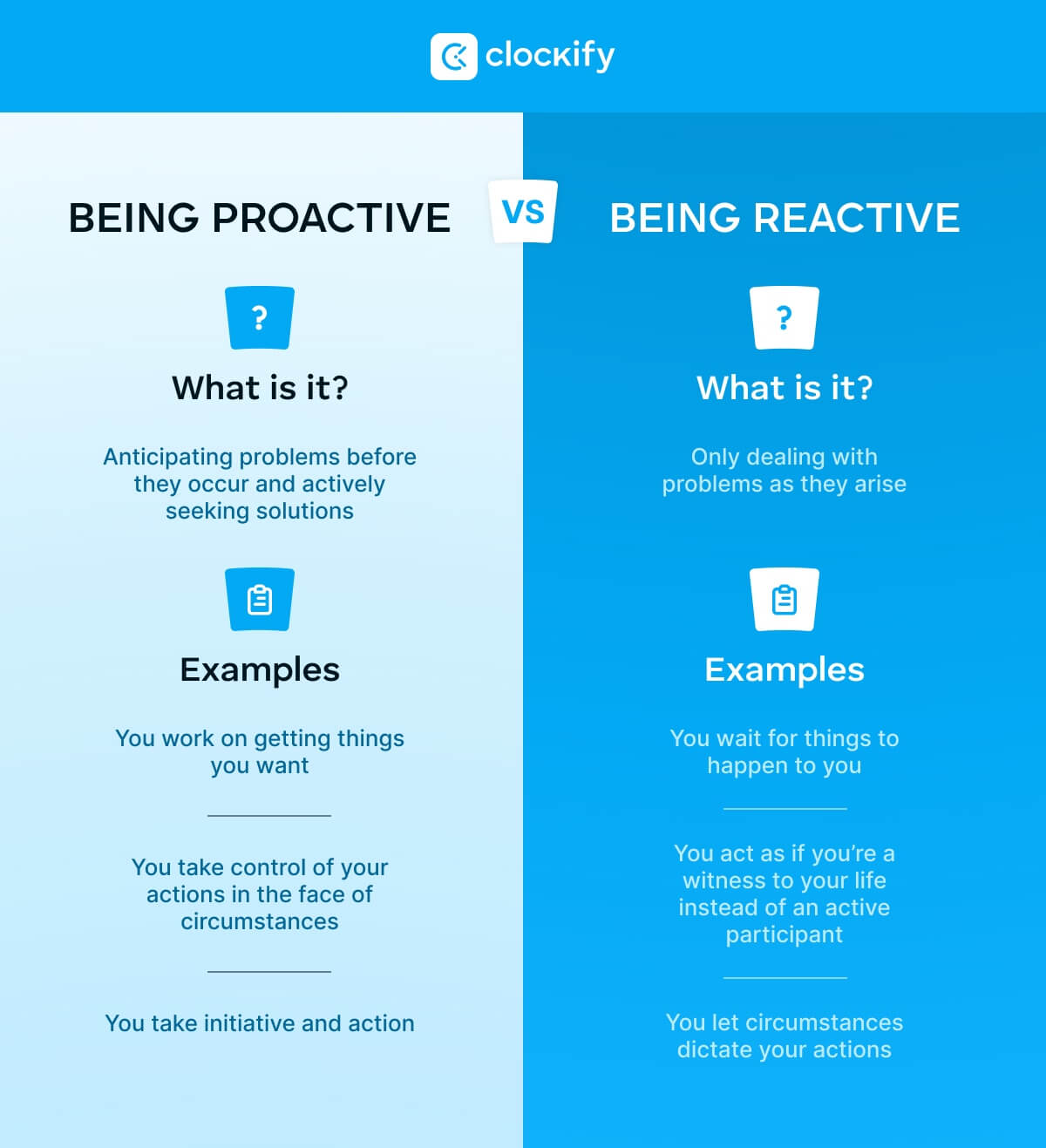
In any situation, whether it’s something happening in your personal or professional life, there’s a stimulus and a response. In between is your freedom to choose what your reaction will be.
Will your reaction be proactive or reactive?
If you’re not sure, here are some additional questions to ask yourself that can help you figure it out:
- Do you have a long-term plan?
- Do you take an active or passive role at work and in life?
- Do you make a decision only when you absolutely have to?
- Do you think about the future and anticipate possible outcomes, or do you have a more live-in-the-moment approach?
- Do you feel like life is just happening to you, and you’re not playing an active role in it?
If your answers show that you prefer to make long-term plans and predict possible future outcomes, you’re most likely a proactive type of person. However, if you find it hard to make calculated decisions and are not action-oriented, it means that you take a reactive approach to life.
If you’re still unsure whether you’re proactive or reactive, it may help to visualize your behavior and its impact on your life.
One way to visualize this concept is through the Circle of Concern and Circle of Influence — explained in the next section.
Circle of Influence vs. Circle of Concern
Stephen R. Covey popularized the concept of proactivity in his book The 7 Habits of Highly Effective People. In fact, being proactive is the first habit he mentions.
In this groundbreaking book, the author introduced 2 concepts:
- The Circle of Concern — includes all the factors outside of our control (e.g., the weather and the state of the economy), and
- The Circle of Influence — encompasses the things we can change or take action on (e.g., your attitude, where you spend your time, and how much effort you put into developing your skills).
In other words, proactive individuals focus on things they can influence, even if they’re not fully in their control. In this case, the Circle of Influence expands, while the Circle of Concern shrinks.
In contrast, reactive people direct their energy toward things they have no influence on. As a result, their Circle of Concern expands and the Circle of Influence shrinks.
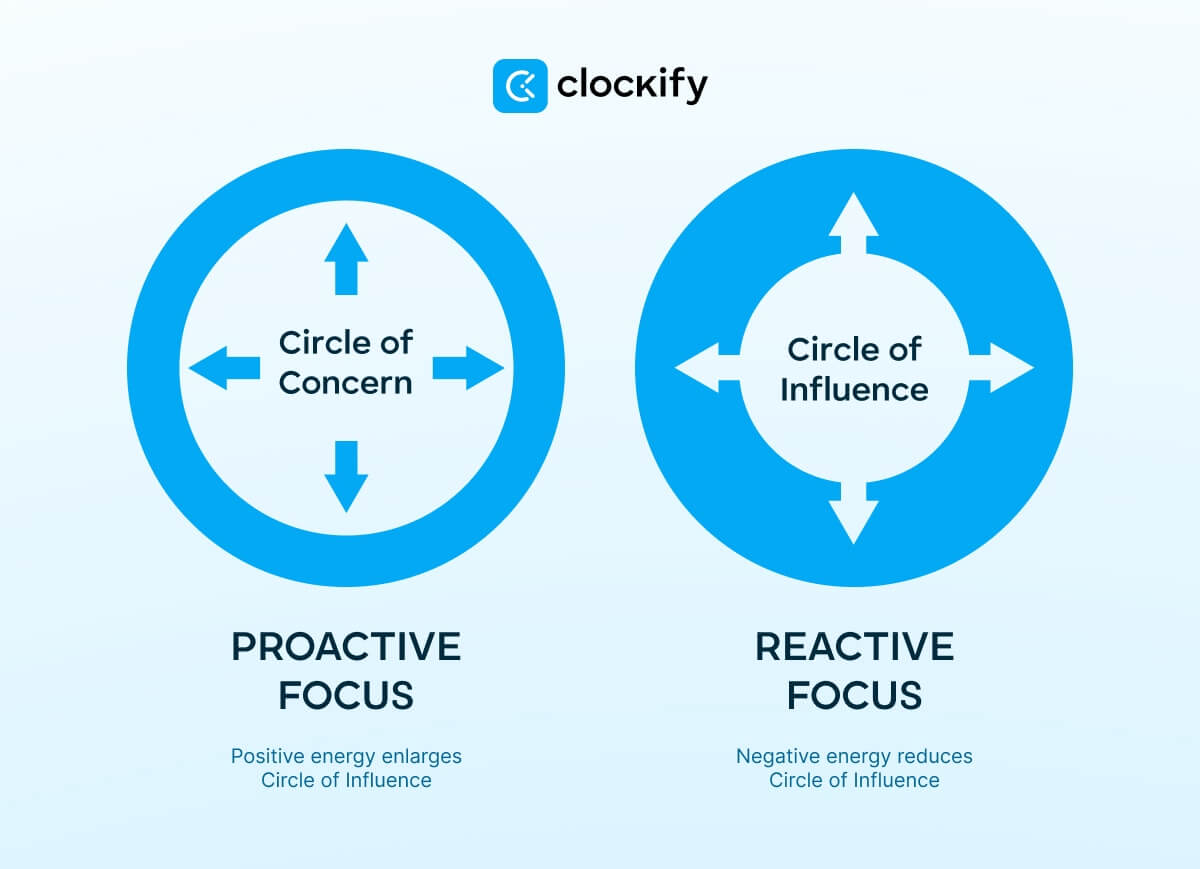
What are the 5 P’s of being proactive?
In her book The Proactive Professional, career expert Chrissy Scivicque defines the 5 P’s of being proactive (each P of the 5 P’s of being proactive represents an action verb) as:
- Predict,
- Prevent,
- Plan,
- Participate, and
- Perform.
Let’s explain each of them.
#1: Predict
To be proactive, you need to consider the future and potential outcomes.
In other words, you need to develop foresight — the ability to correctly predict what will happen in the future. In fact, you need to be ready for any type of problem that might occur.
The first step in learning to predict future events is to pay attention to patterns or routines that typically occur.
However, there’s a catch. For example, if you have a specific business strategy proven to work, you still need to be aware that past results don’t always predict future results. Although some things have worked in the past, there’s no guarantee that they’ll work the same way in the future. You should always leave some room for unexpected circumstances.
As Chrissy Scivicque says in her book, you should “come up with multiple scenarios for how events could unfold.” That way, you’ll be ready to take action, whatever happens.
💡 CLOCKIFY PRO TIP
Did you know that following established patterns and routines also applies to project management? Parametric estimation in project management is a method that calculates the cost and duration of a project by relying on historical data or previous projects. Read more:
#2: Prevent
After you visualize all the possible obstacles that may occur, think about how you could deal with them before they become a huge problem.
Simply put, don’t be passive or afraid to confront challenges. Instead, take control of your life and be more active.
As Chrissy Scivicque also states, challenges must be confronted head-on; therefore, try to prevent problems before they escalate and turn into chaos.
#3: Plan
Planning is another important step towards being proactive.
To plan effectively, you need to shift your focus from the present to the future. To achieve a future goal, you need to plan your steps carefully toward reaching that goal. Think about what you can do today to ensure positive results later on.
💡 CLOCKIFY PRO TIP
If you want to start planning, but don’t know where to begin, here’s our guide to help:
#4: Participate
If you stay aside and just observe what’s happening, you won’t be able to solve anything. To find a solution, you must take an active role.
For instance, participate in discussions with your colleagues, partner, family members, or friends. Basically, in any aspect of your life, it’s much better to be an active participant than a passive observer.
And remember — everyone’s contribution is equally important when making a decision or solving a problem.
#5: Perform
The final stage of becoming a proactive person is showing that you’re willing to put in the actual work.
Now is the time to stop postponing and make a decision. And when you do make a decision, stand behind it.
To be proactive, you can’t afford to be reluctant. So, plan your path toward achieving your goal, consider all possible outcomes, and confidently take that final step.
A proactive person doesn’t act impulsively — they examine and reflect on their actions and, most importantly, recognize that they are responsible for their own choices.
Boost performance with Clockify
How to be more proactive in life
Being proactive in life means taking care of yourself and the things around you. It also involves developing good habits, as you realize that your life is a product of the things you do every day.
To help you become more self-aware and decisive, here are some tips, along with examples, on how to be more proactive in your personal life.
Tip #1: Stop delaying things
If you want to be proactive, you can’t allow yourself to procrastinate. Also, you can’t ignore reality. For example, if you don’t feel well and can see that your condition is worsening, take action. Don’t just wait for your state to improve on its own because the chances of that happening are minimal (if not non-existent).
As the inspirational audio speaker and author of The Daily Motivator To Go, Ralph Marston, said: “What you do today can improve all your tomorrows.”
So, don’t wait for the problem to get bigger; instead, do your best to prevent what you can now.
💡 CLOCKIFY PRO TIP
If you tend to procrastinate, don’t worry — it happens to the best of us. To learn more about procrastination and how you can overcome it, make sure you read our guide:
Tip #2: Have open conversations with people around you
In relationships with others, proactive individuals don’t ignore problems. They don’t take their frustrations out on other people — instead, they regularly communicate their feelings and needs, and when a problem arises, they actively work to resolve it.
At times, you’ll be able to solve a problem by yourself. Other times, you’ll have to work together on solving an issue with the people around you.
For example, if you’re having trouble organizing an event with your friend because they have a bad attitude, and you’re not sure what the reason for that behavior is, ask them openly.
If you don’t take action and simply wait for the atmosphere to become positive on its own, you’ll waste valuable time. As a result, you won’t be able to organize the event, and you may even disappoint others who were counting on you.
When you share your thoughts and the other party does the same, you have a better chance of successfully solving the problem and moving on with the task.
The same applies to your relationship with your partner. Don’t expect your partner to be a mind-reader. If something bothers you, be the one to start a conversation.
Again, this will save you time and prevent smaller problems from escalating into larger and more difficult-to-handle issues.
Tip #3: Understand that you’re in control of your own choices
Even if you sometimes feel like life is too hard on you, try to look at the situation from all angles.
If you encounter a difficulty and your immediate reaction to it is negative, negative thoughts will flood you, making you feel helpless. And if you start feeling helpless, you may even convince yourself that doing nothing about the issue is your only option.
In fact, you always have another option — you just need to focus on the things that are in your control. Ask yourself: “What is it that I can do to solve this problem?” This is what a proactive person would do.
Knowing that you’ve done everything in your power to resolve the situation or minimize the difficulties the situation brings will boost your confidence and put you in the right mindset. You’ll be able to tell yourself, “I’m in control of my own choices” or “I can choose my own attitude.”
Tip #4: Develop self-awareness
Lao-Tzu, the famous Chinese philosopher, once said: “Knowing others is wisdom; knowing the self is enlightenment.”
Developing self-awareness, that is, understanding yourself and your own strengths and weaknesses, is crucial to becoming more proactive.
To get more granular about this topic, we reached out to Bayu Prihandito, a certified psychology expert and life coach. He believes that one of the best tips for being more proactive in life is to focus on self-awareness:

“Being mindful of our thoughts, feelings, and behaviors can better support us to anticipate and adapt to changes in life.”
To act accordingly in any situation life presents, first look inward and practice self-reflection — that’s how your personal growth begins. It helps you analyze your behavior and realize what you could’ve handled differently at the end of the day.
When you accept your own mistakes, manage your emotions, and consider the needs of others, you’re perceived as a reliable person who thinks through their actions before taking them.
Being self-aware is closely related to your personal responsibility — when you have a sense of who you are as a person, it’s easier for you to take accountability for your actions because you’re sure of them.
Being self-aware also helps you know your own limitations. When you’re honest with yourself, you can always work on things you need to change.
Tip #5: Declutter your mind (and your life)
To plan what you want to achieve in the future and how you will achieve it, you need to do so with a clear mind. With too many ideas in your head, you won’t be able to decide where to begin.
To declutter your mind, do the following:
- Start journaling to get rid of unnecessary thoughts and focus on what’s important,
- Stop trying to multitask, and
- Change your lifestyle and make it more organized.
You should properly organize your life to be able to focus on your goals and work on them proactively.
We also spoke with professional organizer Nicole Gabai about the importance of proactivity. Based on her experience, being organized is a key strategy for being more proactive in life:

“When you are organized, you can stop living life reactively, driven by each little crisis, and instead take a more proactive, intentional approach to directing your own life. I’ve found that getting organized clears your mind so you can get on to the more important things in your life and spend more time doing what you really want to do.”
💡 CLOCKIFY PRO TIP
If you haven’t yet found the right way to organize your schedule, the bullet journal method may be the ideal solution for you. Read more about this time management technique below:
What is an example of being proactive in life?
Being proactive means taking control of your life — and below is a perfect example of how to do it.
Let’s say you want to start a side business, pursue an expensive hobby, or follow a passion. To make your dream a reality, you must first take care of your finances. In other words, you have to:
- Create your budget,
- Track your expenses, and
- Make financial goals.
Then, you can consider other factors, such as renting a space for your business or purchasing the pricey scuba gear you’ve had in mind for scuba diving training.
Only when you approach your finances realistically will you be able to make big plans.
Don’t just assume you’ll get a promotion right around the time you intend to invest in a side project or make that deal. Instead, calculate all the expenses you need to cover and start saving money today.
If you need to change your spending habits, do it now. Don’t wait until it’s too late.
💡 CLOCKIFY PRO TIP
If you need help with tracking your expenses, try using Clockify’s time and expense tracking app below:
How to be more proactive at work
If you wanted a promotion, would you:
- Look up what requirements are and work towards meeting them?
- Wait and think about how it’s unfair that you’re not getting it?
We’ve already learned that proactive people aren’t the ones doing the latter.
To learn more about how you can be more proactive at work and achieve your goals, check out the tips we’ve provided for you.
Tip #1: Develop your strategic thinking skills
If your goal is to achieve specific career objectives, such as earning a promotion or advancing to a higher position, you need to start thinking more strategically.
According to an article in Forbes, thinking about larger issues rather than focusing on smaller ones is essential for those who want to advance in their careers. Strategic thinking includes:
- Thinking long-term,
- Focusing on the bigger picture, and
- Considering the various challenges that lie ahead.
Before you can reach those career goals you set for yourself, you need to understand what your contribution to the company is. You need to understand your role within the organization and what additional steps you can take to demonstrate your value and commitment to it.
Maybe you’re spending too much time on some trivial issues, so instead, try shifting your focus to, for example, developing a new set of skills. You never know; maybe those skills will lead you to the leadership position you want.
Bayu Prihandito agrees and adds that proactivity and strategic thinking go hand in hand:

“Being proactive at work revolves around strategic thinking. First, you will need to understand the big picture: your organization’s mission, your role within it, and how you can contribute to it. Then, you can take the initiative to improve processes, solve problems, or generate new ideas. This could involve expanding your skill set, networking with colleagues, or seeking out new opportunities for growth.”
Therefore, to reach your career goals, plan your steps in advance.
Tip #2: Set SMART goals
Having certain career goals in mind is just the first step toward achieving them. You can work tirelessly for months or even years and still stay in the same spot. This probably means your goals weren’t clearly defined to begin with.
In other words, it’s not enough to just have goals — you need to set SMART goals. The acronym SMART stands for 5 characteristics of a goal that you need to consider if you want to achieve your goal successfully (each characteristic is represented by 1 letter in the SMART abbreviation):
- Specific — your goal has to be well-defined and clear.
- Measurable — your goal has to be measurable, that is, you need to set and follow certain criteria that show your progress toward achieving that goal.
- Attainable — your goal has to be achievable, that is, you need to possess all the tools and skills you need to achieve the said goal.
- Relevant — your goal has to be relevant in a way that it holds particular importance in your life (whether it’ll benefit you as an individual or a company as a whole).
- Time-bound — your goal needs to have a clearly defined deadline (to create a sense of urgency and keep you on track to success).
Setting goals with all these characteristics means you’re ready to start working toward achieving them.
By forming clear, well-defined, and realistic goals, you will avoid wasting time and energy on things that don’t matter.
Set and track goals with Clockify
Tip #3: Organize your time better
When you take control of your time, you can plan your activities and ensure your time is spent in a way that increases the likelihood of achieving the desired results.
By using time management strategies, you can improve your work performance and achieve your desired results faster. Here are the strategies you can use to organize your time better:
- Prioritize your tasks — separate your most important tasks from the less important ones. For example, the Eisenhower matrix can help you decide which tasks to prioritize, delegate, or eliminate.
- Create a to-do list system — whether you use your planner, an app, or to-do list templates, sorting your tasks and projects allows you to have a clear overview of all your assignments in one place.
- Timebox your work — allocate a fixed amount of time for each task in advance. For example, open your calendar and choose a task you want to timebox (it can be a report you need to write). Then, allocate a specific number of hours you want to spend on that report, and when the time is up, stop writing. This will help you limit activities that would otherwise take away too much of your time.
- Eliminate workplace distractions — maintain your focus by minimizing work distractions, such as office noise, unnecessary phone notifications, and access to social media. For example, use noise-canceling headphones to dampen disruptive noises around you, and install website blockers, such as Cold Turkey, to restrict your access to distracting websites.
- Automate your tedious and time-consuming tasks — this could mean leveraging automation tools, including email builders and other types of email automation tools, as well as other resources and tools that help free up your time to refocus on more important and priority tasks.
💡 CLOCKIFY PRO TIP
To be more proactive at work, ensure you spend your time efficiently. Here’s an article to help you become more time-efficient:
- Is There a Way to Maximize (Time) Efficiency?
Tip #4: Communicate effectively with your colleagues
Good communication is the key to success — both in personal and work relationships. If you and your colleagues communicate effectively, you have a better chance of achieving positive results, not only on an individual level but also for the organization as a whole.
According to research on how to develop effective communication skills, effective communication means that you:
- Listen to your colleagues actively,
- Voice your own opinions, and
- Have an open mind and accept feedback, including constructive criticism.
This type of communication at the workplace allows you to work proactively.
If you share your opinions promptly, you can prevent miscommunication and possibly even suggest valuable additions to a project you’re all working on.
Also, if you receive constructive criticism and ask for clarification instead of reacting negatively to it, you’ll be able to make improvements on time and successfully complete the task.
💡 CLOCKIFY PRO TIP
As you may already know, teamwork in the workplace is crucial, as it fosters new ideas and ultimately yields better results for the company. To find out more about the benefits of teamwork in the workplace, read our article:
Tip #5: Develop a growth mindset
Being proactive is often closely tied to having a growth mindset. According to expert Bayu Prihandito, developing a growth mindset is one of the most important steps toward becoming proactive:

“Developing a growth mindset means having a belief that our abilities can be developed and improved over time. This mindset encourages us to actively seek out new opportunities, rather than waiting for them to come to us.”
If you have a growth mindset, you:
- Don’t give up when you face a challenge — you persist,
- Don’t see failures as a bad thing, but the opportunity to grow, and
- Are inspired by the success of others instead of being envious.
And of course, a proper growth mindset involves constant motivation to work on yourself and improve.
What is an example of being proactive at work?
To be proactive at work, you need to anticipate problems and actively try to prevent them. Let’s say you have an important meeting, and your task is to prepare a presentation about a project you’re currently working on. As this is your first time presenting, you’re unsure how to properly prepare a presentation, so you feel stuck.
In this situation, a proactive person wouldn’t be afraid to admit they lack experience or skills and that they need help. The next step would be to ask your colleagues for advice — the sooner you ask, the better. This will prevent the entire team from wasting time on a presentation that fails.
Therefore, rather than attempting to complete the presentation unsuccessfully on your own, it’s better to seek guidance. There’s no shame in that.
To prevent problems and be proactive, you need to take action in advance.
How to be less reactive
Besides having a proactive mindset, you’ll need to develop a few skills too. Is being proactive a skill, you may ask? Not in itself, but more like a set of skills on top of each other with a trench coat on.
Take a look at the list below to see which are the most important skills you need to acquire to be proactive.
Skill #1: Be aware of the words you use
Our words have a greater impact on our lives than we realize. So, be aware of how you talk and what phrases you tend to use. For example, do you keep saying the following phrases:
- “I have to”,
- “If only”,
- “I can’t do anything about it”, and
- “Things would be different if _________?”
That language is reactive and undermines your power. Try saying these instead:
- “I get to”,
- “I will”,
- “I choose”, and
- “I will try different alternatives/different approaches.”
Using these phrases will shift your focus from “what I can’t do” to “what I can do,” which is the first step toward becoming less reactive and more proactive.
Skill #2: Plan ahead
Whether they use a regular planner or a time-tracking app, proactive people know how they spend their time and use that knowledge to plan their future more effectively.
For example, you can use a reliable tool like Clockify to track work hours across projects and analyze tracked time. That way, you can see how you spend your time during a workday.
In Clockify, you get to:
- See all your projects in one place,
- Edit time entries, and
- Choose how you want to track your time: start the timer when you begin working or add time manually at the end of the day.
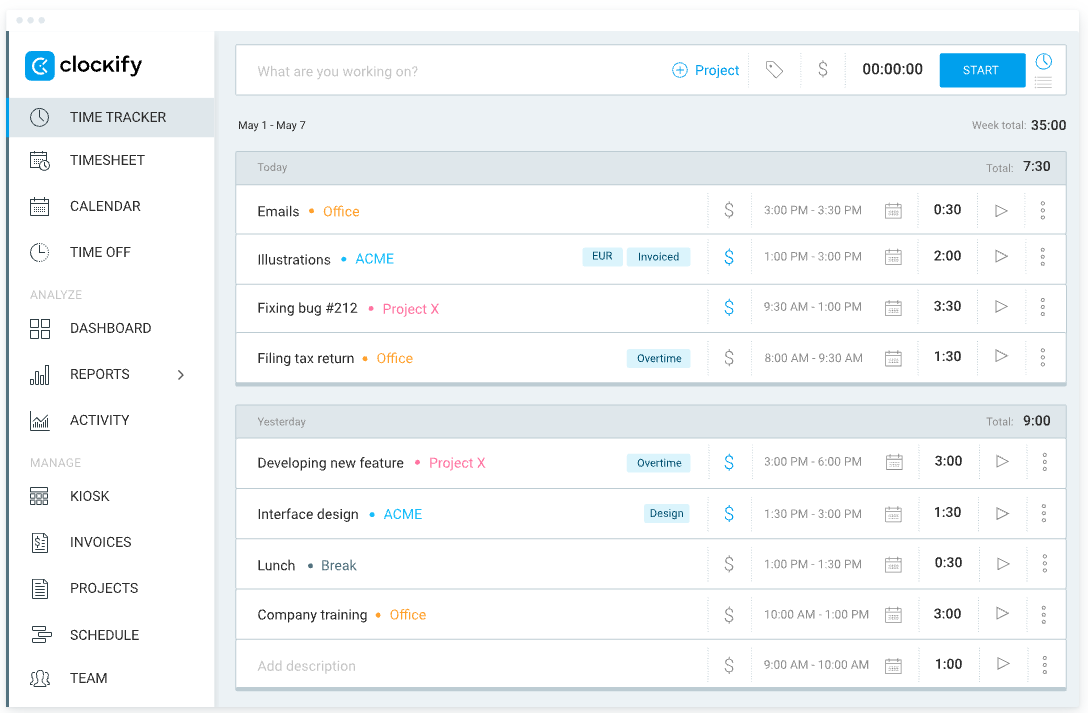
Tracking the time you spend on projects and tasks helps you make better plans for the future. Furthermore, it lets you see how much time you typically need to complete a specific project or task.
Skill #3: Prioritize your tasks
Not all goals and tasks are equally important, and treating them like so may lead to burnout. As we mentioned earlier in the text, using the Eisenhower matrix is an excellent option for prioritizing your tasks.
Prioritizing your tasks can be even easier if you put them in your calendar. This will help you allocate your time effectively and avoid procrastination.
You can use Clockify’s calendar to visualize your day and organize your time.
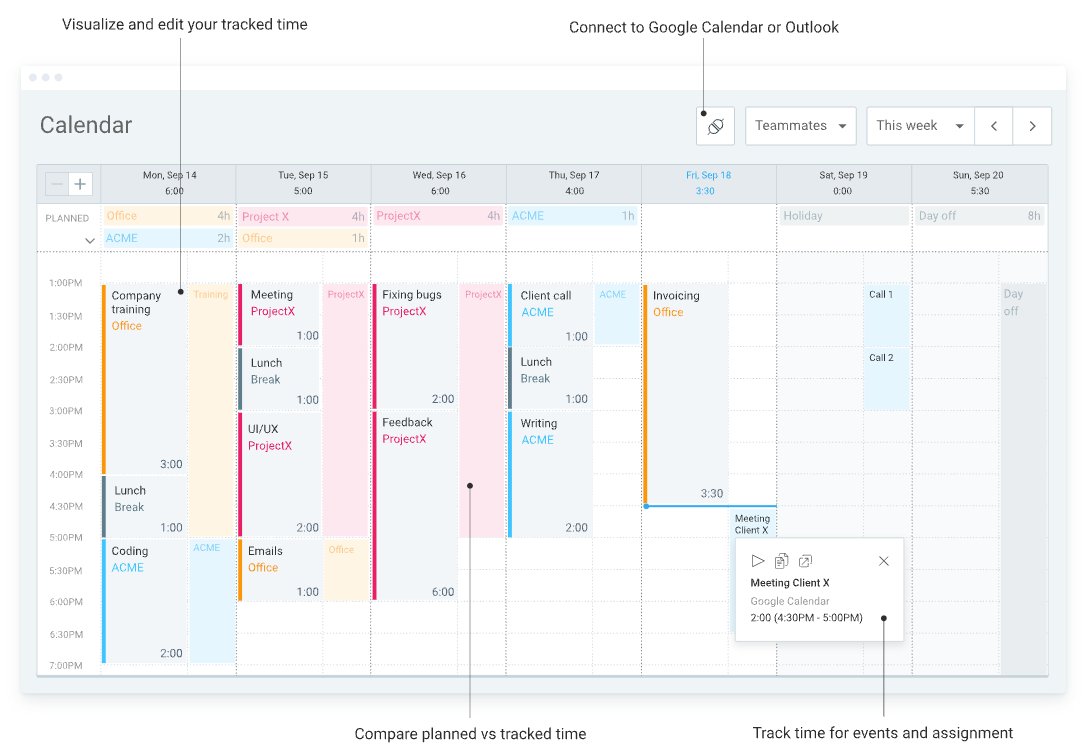
This way, you can:
- Create time blocks for specific activities by adding time entries in the calendar,
- Add and edit time entries as you wish, and
- Open your team members’ calendars to see what their day looked like.
The last item from the list is especially useful because it allows you to stay in the loop with your colleagues — you can see what they’re up to, when they’re available, and make plans accordingly.
Prioritize tasks with Clockify
Skill #4: Learn to problem-solve
Proactive people focus on solving the problem rather than panicking. Instead, identify the problem, develop a plan, and take action.
If you allow your emotions to take over for too long, you’ll feel trapped and incapable of taking action, a characteristic of a reactive person. So, instead of wasting time and stressing about things you think you can’t change, try to make a first step toward getting out of that situation.
The first step is to identify the root of the problem. When you realize it, focus on what you can do to solve it — the more solutions you find, the better. Then, you can choose the most adequate solution that you can use at that moment.
Skill #5: Take action
Contrary to popular belief, good things don’t come to those who wait, but to those who take the initiative and work for what they want.
If you want that promotion, don’t just wait patiently for it — use that time to work on your weaknesses and show your boss that you want to improve.
Research on the correlation between a proactive personality and career growth suggests that a proactive personality benefits employees who want to get promoted. That’s because employees with a proactive personality take action that leads to career development instead of passively waiting for opportunities.
Skill #6: Learn from past mistakes
Mistakes are inevitable, and there’s no way to avoid them altogether. However, you can learn not to repeat the same mistakes by analyzing what went wrong and what you can do better next time. You should use the mistake as an opportunity to improve yourself and your knowledge.
According to a research paper exploring the value of mistakes, reflecting on past decisions to learn from them improves self-awareness and understanding of others. In other words, you become more aware of your typical reactions to specific situations and how other people handle these situations.
In addition, as a Harvard Business Review article on learning from mistakes at work explained, viewing mistakes as lessons helps you improve your skills. It teaches you how to handle similar situations better the next time they occur.
Interestingly, the HBR article offered questions you can ask yourself to reflect on your past decisions and apply them to current situations, such as:
- What decisions are you facing now?
- What makes the current situation stressful, and how can you resolve it?
- What are the previous decisions you can learn from — what went wrong and why?
Bonus tip: Surround yourself with proactive people. They say we are the average of the 5 people we spend time with. Seeing how they approach life, their habits, and how they think will help you become more proactive, too.
Skill #7: Transform anxious energy into productivity
As explained by Psychology Today, anxiety is typically understood as a negative emotion that we need to get rid of to function properly. However, instead of trying to suppress anxiety, you can reframe your thoughts about it.
If you view anxiety as a motivator to do your best, it can actually help you prepare more effectively. For instance, when you feel anxious before a meeting, you can view that as a signal that you need to write down a detailed plan of what you’re going to say and predict potential issues in advance.
This means you won’t spend time thinking about how the meeting will go. Instead, you’ll be more proactive, i.e., use that time productively to make a plan.
As a result, you won’t feel as anxious at the actual meeting, so you’ll likely lead the meeting more confidently, thus achieving better results.
Why proactivity can be a double-edged sword
Proactive individuals are generally high achievers and tend to achieve career success more quickly when they’re in the right environment.
However, proactivity can be a double-edged sword.
For illustration, you don’t need to be proactive at all costs, especially at work. Sometimes you have to read the room and figure out if it will be appreciated.
Not all working environments are open and healthy — in some workspaces, proactivity can bring more harm than good. Therefore, you should be aware of:
- Envious coworkers,
- Punitive bosses who will get you in trouble if you make a mistake, and
- Environments that refuse to let go of outdated systems (you’ll hear things like “Changing things may upset the employees” or “Who do they think they are”).
Building interpersonal skills is imperative because, in some instances, being proactive can be perceived as annoying or obnoxious.
On the other hand, there are situations where it’s better to be reactive. If your friend is venting to you, perhaps it’s better to listen to them and be their shoulder to cry on, rather than offering solutions and advice (especially if they didn’t ask for it). Sometimes people just need someone to listen to them.
Also, keep in mind that you can’t plan and predict everything; sometimes things just happen.
Perhaps your goals need to be adjusted due to changed circumstances, or maybe you encountered an unforeseen obstacle that no one could have anticipated. Life is unpredictable, and at times it forces you to be reactive, and that’s okay.
The benefits of being proactive
Being proactive brings numerous positive changes to your life. It helps you become a better version of yourself and overcome challenges confidently.
To see why you should take initiative in your work and life, consider some of the benefits of being proactive below.
Benefit #1: Being proactive allows you to shape your own life
Being proactive means taking control of your life.
Even though you sometimes feel like your destiny has already been written, that’s not the case. When you have the desire to change certain things in your life, you can definitely do it — you just have to take action.
One of the main benefits of being proactive is that it allows you to shape your own life. As Bayu Prihandito also adds, proactivity empowers us to shape our lives and careers according to our own aspirations:

“Instead of merely reacting to circumstances, we set the pace and forge our own paths.”
When you shift your mindset from being a passive observer of your life to an active participant, real changes in your life and work begin to occur. Your life becomes the one you’ve always wanted to live.
Benefit #2: Being proactive leads you to career growth
To show better performance at work and reach your career goals, you need to work on it actively. And you need to work on it every single day.
When you show that you’re ready for change and capable of improvement, success is inevitable.
Being proactive helps you improve your workplace skills, such as:
- Time management skills,
- Communication with your colleagues,
- Teamwork skills, and
- The ability to solve problems.
Moreover, our contributor, Bayu Prihandito, says that being proactive is essential for our career growth:

“It enhances our resilience, problem-solving skills, and capacity to innovate. This, in return, can lead us to higher job satisfaction, improved performance, and accelerated career growth.”
💡 CLOCKIFY PRO TIP
The first step toward creating a better future for yourself is setting clear career goals. Read our blog post on the subject and learn how to set your career goals successfully:
Benefit #3: Being proactive reduces stress
According to research on how proactivity reduces the possibility of burnout, employees who display proactive behavior are more likely to actually prevent career burnout. By taking the initiative to change and improve, employees take matters into their own hands, thereby reducing stress.
If you’re stressed at work to the point where you can’t perform to the best of your ability, you won’t be able to stay productive and focus on your goals. In addition, people you live with will sense your dissatisfaction with work as soon as you enter your home, so your personal life may also be at risk.
Not only does being proactive help you reduce stress, but it also enables you to maintain a healthy work-life balance. When you think about your deadlines in advance and meet them accordingly, you have more time to spend with your loved ones. And this is the perfect balance we all seek.
💡 CLOCKIFY PRO TIP
Staying productive while working increases your job satisfaction and helps maintain a good work-life balance. To see all the ways you can improve the quality of your work life and thus improve the overall quality of your life, read our blog post:
Use Clockify to become and stay proactive
Sometimes, things don’t go as planned.
For example, you might be wrapping up your work tasks for the week. But then you suddenly realize you failed to track your work hours for the whole week.
Aagh!
For different reasons, your boss, accounting, and others in your department might frown at you.
Luckily, a powerful time tracking system like Clockify comes to your rescue with its timesheet reminders.
Once you set it up, a timesheet reminder nudges you to log and submit your timesheets — like below:
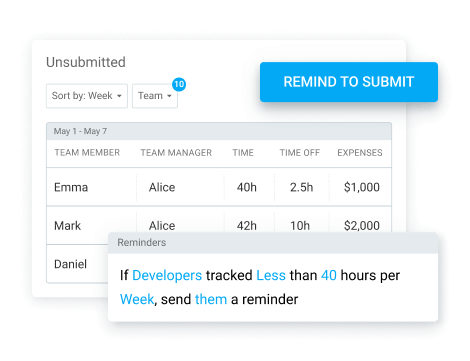
With this feature, you can choose the department, the number of hours, and other criteria to tailor the timesheet reminder to your team’s or your personal needs.
But there’s more.
Suppose you forget to start your work timer at a specific hour. In this case, you can set up another reminder that prompts you to start your timer if you fail to do so at your regular start time (such as 9 a.m.).
Ultimately, it all comes down to becoming more proactive in measuring your productivity.
Apart from being proactive, high achievers know where their time is going. If you want to join that cheerful bunch, start tracking your time with a time tracking tool that increases your productivity and reduces your work-related stress.



